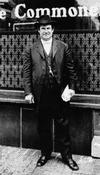- Bryan, William Jennings
-
died July 26, 1925, Dayton, Tenn.U.S. politician and orator.He practiced law at Jacksonville, Ill. (1883–87), before moving to Lincoln, Neb., where he was elected to the U.S. Congress in 1890. In the U.S. House of Representatives (1891–95), he became the national leader of the Free Silver Movement; he advocated its aims in his "Cross of Gold" speech, which won him the Democratic Party nomination for president in 1896. He was the party's nominee again in 1900 and 1908. In 1901 he founded a newspaper, The Commoner, and thereafter lectured widely to admiring audiences; he was called "the Great Commoner." He helped secure the presidential nomination for Woodrow Wilson in 1912 and served as his secretary of state (1913–15), contributing to world law by espousing arbitration to prevent war. A believer in a literal interpretation of the Bible, he was a prosecuting attorney in the Scopes trial (1925), in which he debated Clarence Darrow on the issue of evolution; the trial took a heavy toll on his health, and he died soon after it ended.
 William Jennings Bryan, с 1908.Library of Congress, Washington, D.C.
William Jennings Bryan, с 1908.Library of Congress, Washington, D.C.* * *
▪ American politicianborn March 19, 1860, Salem, Ill., U.S.died July 26, 1925, Dayton, Tenn.Democratic and Populist leader and a magnetic orator who ran unsuccessfully three times for the U.S. presidency (1896, 1900, 1908). His enemies regarded him as an ambitious demagogue, but his supporters viewed him as a champion of liberal causes. He was influential in the eventual adoption of such reforms as popular election of senators, income tax, creation of a Department of Labor, Prohibition, and woman suffrage. Throughout his career, his Midwestern roots clearly identified him with agrarian interests, in opposition to those of the urban East.Reared in Illinois, Bryan practiced law at Jacksonville (1883–87) before moving to Lincoln, Neb., where he was elected to the U.S. Congress in 1890. Renowned as a gifted debater, he opposed high tariffs and came to be considered the national leader of the Free Silver Movement (bimetallism) as opposed to the “hard money” policy of the Eastern bankers and industrialists, who favoured the gold standard.Defeated for the U.S. Senate in 1894, he spent the next two years as editor of the Omaha World-Herald and as a popular public lecturer. The climax of Bryan's career was undoubtedly the 1896 presidential campaign. At the Democratic convention in Chicago, his famous “Cross of Gold (Cross of Gold speech)” speech (July 8) won him the nomination at the age of 36.His solution for the depressed economy after the Panic of 1893 was an “easy money” policy based on the unlimited coinage of silver at a ratio to gold of 16 to 1. On that platform he also received the nominations of the Populist and National Silver parties. In the ensuing campaign, he travelled more than 18,000 miles through 27 states and attracted a large and enthusiastic following, but the well-financed Republican machine won 271 electoral votes for William McKinley, to Bryan's 176. Bryan lost to McKinley again in 1900 and to William Howard Taft in 1908.In recognition of his role in securing the Democratic nomination for Woodrow Wilson in 1912, Bryan was appointed secretary of state the following year. Despite his diplomatic inexperience, he made a distinctive contribution to world law by espousing arbitration to prevent war. Bryan convinced thirty-one nations to agree in principle to his proposal of new treaties that would provide a “cooling-off” period of one year during which a question in dispute could be studied by an international commission. In the meantime World War I broke out. An avowed pacifist, Bryan finally resigned over Wilson's second note to Germany (June 8, 1915) protesting the sinking of the “Lusitania.” Nonetheless, he urged loyal support of the war when it was finally declared.The concluding episode of his life was the famous Scopes Trial in July 1925. A firm believer in a literal interpretation of the Bible, Bryan went to Dayton, Tenn., to assist in the prosecution of a schoolteacher accused of teaching Darwinism, or the theory of the evolutionary origin of man, rather than the doctrine of divine creation. With Clarence Darrow as chief defense counsel, the trial attracted worldwide attention as a dramatic duel between fundamentalism and modernism. John T. Scopes was found guilty and fined (later overruled), but the excesses and passions of the court battle took their toll: soon after the trial, Bryan fell ill and died.Additional ReadingBryan's life and work are examined in Paolo E. Coletta, William Jennings Bryan, 3 vol. (1964–69); Robert W. Cherny, A Righteous Cause: The Life of William Jennings Bryan (1985, reissued 1994); LeRoy Ashby, William Jennings Bryan (1987); Donald K. Springen, William Jennings Bryan (1991); Lawrence W. Levine, Defender of the Faith: William Jennings Bryan (1965).* * *
Universalium. 2010.
